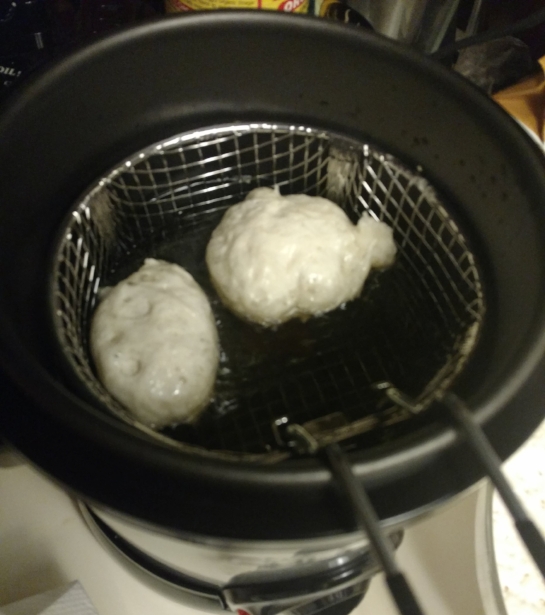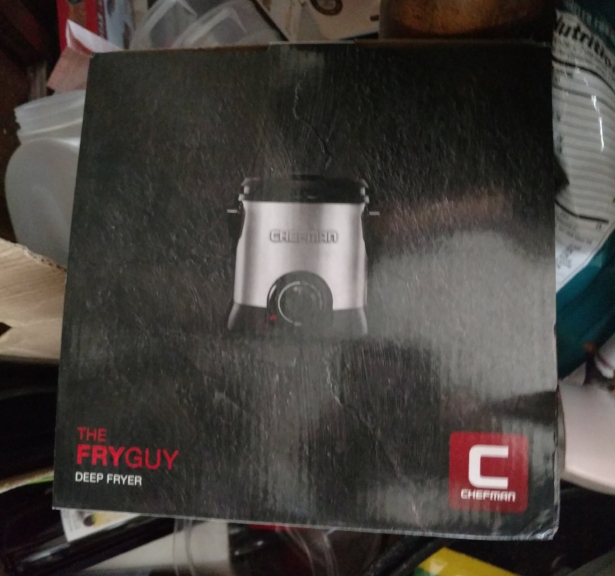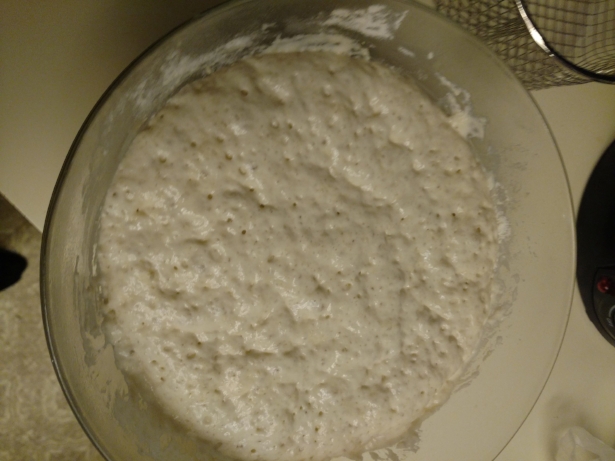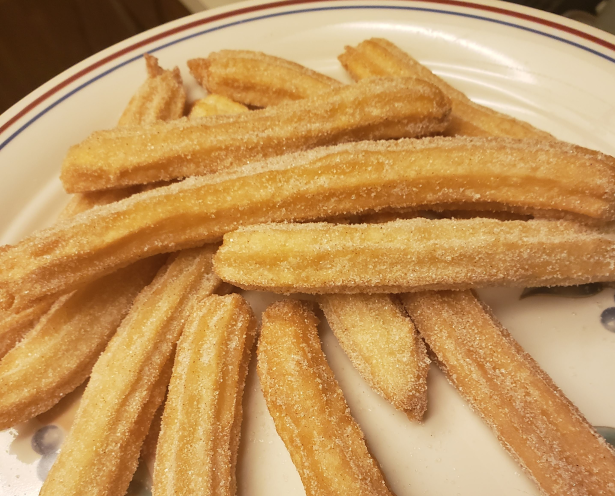KC 114 - Step up For Zeppola

Why hello there, and welcome back to Kitchen Catastrophes. Today’s post is remarkably like the last two posts I made, in a somewhat humorous twist. I assure you, I didn’t plan for things to pan out quite like this. We’ll get into the specifics in a bit. And if you want to skip the specifics, here’s a link to the recipe. But for those staying: first, what exactly are we doing?
Put a little Pep in Your Zep
Today’s recipe is for zeppole, a word I only just learned is the plural form. In the singular, the dish is zeppola. Luckily, explaining what they are is less difficult than learning HOW to say what they are: they’re doughnuts. Seriously, they’re deep-fried balls of dough that are sometimes filled with custards and jellies, and whose texture varies based on region and season. They’re Italy’s version of doughnuts.
Babida-boobidy?
The only real distinction from doughnuts is the fact that zeppole are balls-shaped, not circular. Humorously, this speaks to something of the divide between Italian and American cuisine choices. Supposedly, the reason doughnuts have holes (and before you ask, yes, I know that “donut” is the more common spelling. We’ll get to why I use the other form in a second.) is because of Americans complaining.
See, doughnuts were first brought to America as olykoeks, which was the American Dutch (yes, we had a variant form of the Dutch language back in the day. The Dutch were quite important to this country’s founding, as the city of New Amsterdam- I’m sorry, New YORK, would attest.) spelling of oliekoek, meaning “Oil cake”. Because the recipe was “Make a sweet cake batter. Drop balls of it into hot oil, and eat when done.” This recipe had been made by a lot of cultures, but supposedly an American sailor was the first to come up with the rounded shape…for a kind of stupid reason. See, some guy by the name of Hanson Gregory claims HE invented the ring-shaped donut, because he was sick of the middle of the donut not being fully cooked. That makes sense, right? The outer edges will cook in the fat, so by the time they’re done, the inside won’t be.
Except no one else had this problem, because they knew that meant YOU WERE MAKING THE DOUGHNUTS TOO BIG. That’s where the name came from: the balls of DOUGH are meant to be roughly NUT-sized when dropped into the oil! A zeppola shouldn’t be more than 4-5 inches wide when fully cooked. America went “Man, these fried cakes are great, but the middles are always undercooked.” And rather than think “Maybe I should be using less cake”, we said “Well, if I just twist the dough into a RING, I can get more surface area for cooking!”
Even in 1847, we were pushing the boundaries of culinary madness.
Meanwhile, the spelling changed around the early 1900’s for two reasons, and they’re both kind of insulting: The first recorded use of “donut” is in a novel, where a young boy uses it, while also saying “gaul-durned” and otherwise abusing the good name of English. And that’s the first reason of the spelling: mocking the ignorant. The LA Times in 1929 used it next to “gud bred”, and ‘well-dun’, about how crappy people were at spelling these days. The OTHER main reason is a company selling doughnut-making machines looked to expand to foreign markets and said “Hmmm. But what if they can’t figure out how to pronounce the word? Maybe they won’t buy our machines.” So the word “donut” came around by mocking the under-educated, and assuming foreigners are idiots. Hence why I hold to the original spelling: to not be an asshole by linguistic belittling. (Nah, I didn’t know any of that until I looked it up a few days ago. The real reason is I couldn’t remember how to spell the shorter one, since my family doesn’t eat them very often, but I did remember “dough” and “nut”.)
That was…a lot of time spent on doughnut history. Let’s get back on topic. Today’s dish does share a mildly interesting connection with last Monday’s post: it’s directly influenced by Moorish interactions with Europe. And by “interactions”, in this specific instance, I mean “invasion”. Remember how I briefly mentioned that Sicily was conquered by Muslim forces, a war that took over 140 years to finish? At the time, it was nothing more than a side-note, and an opportunity to make a joke about the infamous intractability of Sicilians. But it turns out, it was also FORESHADOWING! See, the WORD zeppola is a loanword from Arabic to Sicily, a transliteration of zalabiyya (or, less formally, zalebi) , or “fried ball of dough.”
However did they come up with the name?
But enough of histories, and etymologies! We are hear to cook, are we not? SO how do we form this Italian dessert of puffed pastry?
Going Down like a Led Zeppola
One last etymological side-note: No, “zeppelin” has nothing to do with Zeppole. Zeppelin is German, and it’s from a relatively small municipality that was originally named “Cepelin”, and the name just shifted over time. Later, General Ferdinand von Zeppelin, AKA “Ferdinand, from Zeppelin” invented a type of rigid-air ship that historically had no safety issues whatsoever.
To answer the question of last section: You make dough and drop it in oil. Duh. Did you miss the entire explanation of what we’re doing?
I mean, it wasn't exactly a complicated process.
Yeah, there’s a reason I spent a couple hundred words on the history of Doughnuts (and the history of the WORD doughnut, if we want to be picky): This recipe is pretty damn straight-forward. Make a dough, scoop out balls of it, and plop the balls in oil.
But that doesn’t mean we have nothing to talk about! Let’s get a little personal, eh? Sometimes of late my posts have felt somewhat dry, or…disconnected, let us say. Other than my voice, they don’t connect with ME. And that’s a little on purpose: I noted that as my father battled cancer last year, my posts got a little leaden, so I took a mental step back, and focused on exploring the sense of academic joy and frustration I got from things. Now, I feel, we can let a little more of “me” slip in, just as the dough slips into the oil. METAPHORS.
Today’s post is at least partly possible because of a Christmas present that I received this year, just like last week’s relied on a gift for Nathan. While Nathan got a Pasta roller, I got a deep fryer!
Chefman would be my superhero name if the accident that gave me my powers also robbed me of all my goddamn creativity.
And before I get concerned emails, that’s not a hidden slight about Nate and my’s relative eating habits. Rather, it’s about two emotional factors: therapy, and fear.
Now, before you think this shit is about to get heavy, don’t worry. By “therapy”, I mean “retail therapy”: the act of shopping, or buying things, primarily to make you feel happier. It’s a hobby that both my mother and I have been known to indulge in, with restrictions. We’re not running out buying Lamborghinis or Gucci. No, it’s more like “I feel frustrated right now, so I’m going to go buy the groceries for the week.” That’s the main venue for both of us, though we have our quirks beyond it. My mother buys housewares and tools for improving the home, while I like to trawl thrift shops for flashy clothes or impressive deals.
Giant fur coat that makes me look like a Russian autocrat? $50.
As such, during Black Friday, we saw a home-use Deep Fryer for something like $10, and said “yeah, sure, that can be a gift for Jon.” Our thought process was that it might be safer than a standard pot arrangement, which is important to us. Why? Because of fear.
Years and years ago, I was frying taquitos or flautas in oil for a Cub Scout dinner. All the little tubes were bubbling away in about an inch of oil in a high-sided griddle at a local church. As I was rotating them, to ensure even browning, one of the taquitos popped. Something inside it boiled, and the pressure caused it to explode. It flung maybe a teaspoon of hot oil, steam, and flecks of flauta around, a lot of which went straight up at the underside of my arm. I was burned. Not to any great extent, mind you. There’s no scars or marks. There was a little archipelago of red on my wrist for maybe two weeks. But for some reason, that incident seared itself in my brain as a (definitely-not-really) traumatic experience.
As such, one of the few times you’ll see me flinch in the kitchen is whenever I have to deep-fry foods. Any time I have to deal with open, bubbling oil, I’ll get hesitant and jumpy. It’s a silly little psychic scar. I’ve been hurt MUCH worse by food and food equipment since then. Hell, one of the few permanent scars on my body is where a blender punched through my middle finger twice while I was cleaning it (still plugged in, like an idiot), but do I flinch around blenders? Nope!
Zep Up 2: The Streets
Anyway, we got the fryer as a way to placate my panicky brain, and decided to trot it out to make these Italian dough-balls. So we started with the dough, duh. Zeppole use a yeasted dough, for a lighter product. Texture-wise, the closest comparison I have is Elephant Ears, like you get at state fairs, or really big blobs of funnel cake.
Did somebody call for a big blob of dough?
The dough is simple: water, yeast, flour, sugar, salt, vanilla, and baking powder. That last ingredient may be a bit of a surprise if you’re something of a baker. If not, let me explain why. (Because, again, we’re already almost done with the actual recipe.) Baking powder is a leavening agent, meaning that it makes doughs lighter. The chemistry behind it is relatively unimportant for the moment, so I’ll just say that when it gets wet, it starts making gas. This puffs up the bread it’s in, and makes it lighter. Baking soda does a similar thing when mixed with acids. (Slight SCIENTIFIC side note: technically, Baking soda does the SAME thing, because baking powder, when wet, dissolves into an acidic liquid…and baking soda. Baking powder is just self-processing baking soda. (that statement is a very useful analogy that is also completely wrong in several fundamental aspects.)) As such, it’s not common to see yeast AND baking powder in a product, because they do the same job. Heck, baking powder is typically used whenever you DON’T want yeast, either to avoid the fermented flavor, or because you want to eat sooner than 2 hours from now.
Three if your plastic wrap turns against you, and tries to eat your scissors .
Once you make the dough, since it uses yeast, it’s gotta sit. Cover it and let it go until it doubles in size, somewhere around half an hour. In the meantime, you can fill up your frying device with oil, and get it to temp. We’re going for 350 degrees Fahrenheit. Hot enough to crisp the outside, but not so hot it’ll burn before the insides finish cooking, GREGORY. If you’re not using a swanky new fryer, just get a big pot and fill It about 1.5 inches deep with oil, and plop a candy thermometer in it.
Then, it’s frying time. Remember what I said early about doughnut size? Here’s some good evidence: each zeppola should only be a little more than a tablespoon of dough when it goes into the oil. And here’s where our process becomes like ANOTHER recent post: the Fried Chicken Skin Steamed Buns. While each individual batch’s cooking time isn’t particularly long (2-3 minutes), this recipe makes around 16 tablespoons of dough. And…well, see, my home deep fryer can really only fit 2 or 3 zeppole at a time, unlike the SIX you’re expected to be cooking at once in a big pot. So what was intended to be about 10 minutes of Frying turned into 30 for me.
Also, one of the first zeppole I dropped into the batter stuck to the bottom of the fry basket, which lead to some chaos trying to get it clean for the next batches. But EVENTUALLY, we had a whole batch of the suckers, and we dusted those dudes in some powdered sugar, and damned if they didn't look like we nailed that shit.
Mama mia, thatsa sweet not-meata-ball!
And they were…fine? We may have been done a disservice by our lighting in this regard. See, there is a faint yellowish tint to the fluorescent lighting we use in our kitchen. During the day, it’s fine, because it’s balanced by the natural light coming from the window, but at night, it can cause things to look a little wonky. As such, NONE of our Zeppole looked done at 3 minutes like the recipe said, so we cooked them an extra minute or so for the right color. And they all ended up tasting kinda oily. So we clearly went wrong somewhere. Maybe our air was more humid/cold, and we should have gone with a slightly higher oil temp, maybe we should have trusted the recipe time instead of our eyes. I don’t know. But they were okay. Nothing to be super excited about, but not dismal excuses either. And really, the only real loss was the amount of oil we had to use, and that’s what, $7? For 15 mediocre donuts? Not the worst deal in the world at all. And at least it didn’t think I was too stupid to spell “mediocre”.
If you want to help Jon afford more oil for future frying fiascoes, support the site on Patreon! We’re close to completely covering the site’s technical costs, so just one or two more Patrons can really make a difference! If you’re broke as a joke, no need to choke, we completely understand. Just invite your friends to like our Facebook page, and share our posts, so that more people can get a laugh out of Jon’s fear of oil, and Jon can get a sense of satisfaction and momentary meaning when he checks the traffic numbers.
THURSDAY: JON, FRESH OFF WEEKS OF DOING SHIT, TAKES THINGS EASY, AND REVIEWS A YOUTUBE SERIES. HE ALSO TALKS ABOUT THE VALIDITY OF THE ART OF CRITICISM. SO…THAT’S SOMETHING.
MONDAY: JON STEALS FROM THE BEST, BY MAKING TWO WEIRD SANDWICHES SNATCHED FROM ALTON BROWN’S HANDS.
Recipe
Zeppole
Makes 15-18 doughnuts
Ingredients
1 1/3 cup all purpose flour
1 tbsp sugar
2 tsp instant yeast
1 tsp baking powder
1 cup warm water
½ tsp vanilla extract
Peanut or Vegetable oil for frying
Powdered sugar for dusting
Preparation.
1. Mix the dry ingredients together, then whisk in the water and vanilla until fully combined. Cover and let rest until doubled in size.
2. Heat oil to 350 degrees Fahrenheit over medium-high heat, and, if desired, warm your oven. You can store the cooked zeppole in the oven until they’re all finished frying.
3. Scoop rounded tablespoons of dough into the hot oil, frying for 2-3 minutes, flipping once half-way through. Remove with a slotted spoon or spider, and place on a wire rack topped with paper towels. (I just realized we put the towels UNDER our wire rack, so maybe that was our problem: we didn’t get enough oil OFF of the dough after frying.) Continue until done.














